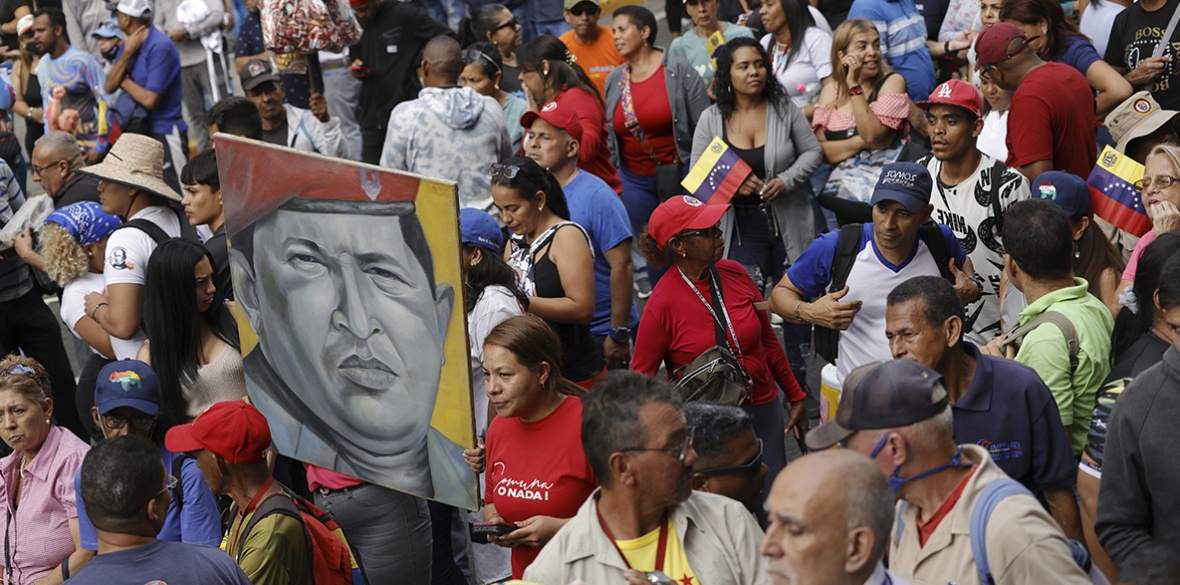This is the last article you can read this month
You can read more article this month
You can read more articles this month
Sorry your limit is up for this month
Reset on:
Please help support the Morning Star by subscribing here
A TERRITORIAL dispute between Venezuela and Guyana over the Essequibo region, a century old but recently resurrected, has just been jointly agreed to be settled peacefully and in accordance with international treaties.
The agreement was reached through a diplomatic initiative by Ralph Gonsalves, the Saint Vincent and the Grenadines PM and president of the Community of Latin American and Caribbean States (Celac), with the Caribbean Community (Caricom) and Brazil’s President Lula also being involved.
But both the United States and Britain seized on the opportunity afforded by the dispute to stoke up hostility towards Venezuela. The US Southern Command (USSouthCom), which has long been battle-ready to attack Venezuela if required, initiated “flight operations” within Guyana on December 7, in collaboration with the Guyana Defence Force (GDF).
Britain meanwhile sent the warship HMS Trent to conduct what the MoD called “training exercises” with Guyana’s military, as a junior Foreign Office minister declared in the Commons that “the people of Guyana deserve to be free from the threats to their country.”
Unpicking this issue involves going back two centuries to when the territorial dispute first emerged, with Britain playing a nefarious role.
Despite recognising in 1824 Venezuela’s independence and borders, within which lay the Essequibo region, Britain unilaterally redrew the border in stages to add 167,830 square kilometres of the region to its neighbouring colony, British Guiana.
An arbitration commission in 1899 awarded almost 90 per cent of the disputed territory to Britain, but 50 years later it was revealed that the Russian chair and judge of the commission had colluded with the two British judges to coerce the other two judges to arbitrate in favour of Britain.
Venezuela’s renewed pursuit of its claim in the light of this revelation finally led to the Wilson government negotiating the 1966 Geneva Agreement, accepting the dispute existed and setting out a protocol to resolve it.
On its independence months later, Guyana also recognised this agreement — which invalidates any current argument by the British government that the border was unequivocally settled in 1899 through international arbitration.
A further 40 years on, enter the other imperial power, the United States, into the picture.
As president of Venezuela, Hugo Chavez’s vision of a Latin America free from US domination inspired in part his programme of nationalising key industries, especially oil. While other multinationals accepted Venezuela’s new terms, US oil giant ExxonMobil failed to strike a deal in 2007 to stay in two multibillion-dollar oil projects being nationalised.
While seeking enormous compensation from Venezuela, ExxonMobil simply moved on to investigate how it could exploit other South American countries’ natural resources.
It had previously been exploring for oil with Guyana’s blessing in the disputed territory, thus contravening the 1966 Geneva Agreement. But in 2015 it discovered in the Essequibo region one of the largest oil finds in recent years, with rich rewards. Guyana, however, retained just 25 per cent of the oil revenue, with ExxonMobil keeping 75 per cent while being exempt from any taxes.
This business is a high risk for Guyana, given Exxon’s appalling record on health and safety (its tanker Exxon Valdez spilt 11 million gallons of oil off Alaska’s coast in 1989, suffering $5 billion in punitive damages as a result). ExxonMobil has also somehow managed to avoid giving a guarantee that it will cover all costs relating to any possible oil spills, despite the requirements of permits granted by Guyana’s Environmental Protection Agency.
By 2015 Guyana was determinedly set against Venezuela, joining in the US-led destabilisation of the country, spearheaded by the US programme of sanctions aimed at achieving “regime change.”
Its new president in 2020, Irfaan Ali, has formally proposed that USSouthCom should set up military bases in Guyana as “protection” against Venezuela, a move condemned by Venezuela for threatening the region’s stability by opening up “the possibility for an imperial power to install military bases.”
Venezuela’s position is that “the territorial dispute will only be resolved through dialogue, mutual respect and commitment to preserve the region as a zone of peace, free from interference.”
The joint agreement reached between Venezuela and Guyana is a key step to the peaceful resolution of this dispute, standing against a push by the US and ExxonMobil for war against Venezuela which must be resisted.
Join the Venezuela Solidarity Campaign at www.venezuelasolidarity.co.uk/join.












